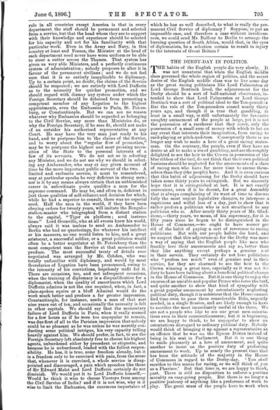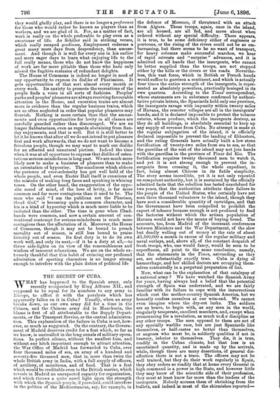THE DERBY-DAY IN POLITICS. T HE habits of the English people
die very slowly. It was not unnatural that when the English middle class governed the whole region of politics, and the secret desire of the English middle class was to live some day as the great racing politicians like Lord Palmerston or Lord George Bentinck lived, the adjournment for the Derby should be a sort of half-national observance, in- tended to show that Lord Palmerston or Lord George Bentinck was a sort of political ideal to the Ten-pouudei But the rule of the Ten-pounders ceased nearly thirty years ago, and though it is true that gambling, at least in a small way, is still unfortunately the favourite naughty amusement of the people at large, yet it is not the possession of a racehorse that they covet, only the possession of a, small sum of money with which to bet on any event that interests their imagination, from racing to card-playing or pitch-and-toss. Consequently there is no longer any wish to make a hero of a great racing states- man. On the contrary, the people, even if they have no desire at all to make a sin of gambling, and are thoroughly delighted to see the heir to the Crown in possession of the blue ribbon of the turf, do not think that their own political business should be neglected for the amusements of a class of racing men who have far more time to amuse them- selves than they (the people) have. And it is even curious that this habit of adjourning for the Derby should have taken some thirty years to extinguish. But we sincerely hope that it is extinguished at last. It is not exactly convenient, even if it be decent, for a great Assembly that is always complaining of its want of time to discuss fully the most urgent legislative changes, to interpose a capricious and wilful loss of a day, just to show that it rather prefers a politician who is not straitlaced to any politician who is. After nearly thirty years of Mr. Glad- stone,—thirty years, we mean, of his supremacy, for it is fifty years since he began to be distinguished in the House of Commons,—we ought to have sooner got rid of the habit of paying a sort of reverence to racing politicians. But with our people habits die hard, and we suspect that this adjournment for the Derby was more a way of saying that the English people like meu who frankly love their amusements and say so, better than they like anything except perhaps a genuine zeal in their service. They certainly do not love politicians who " profess too much " even of genuine zeal in their service, for they are charmed to see the heir to the Crown winning a great race, especially as it was not his duty to have been talking about a beneficial political change in the House of Commons. But it is one thing to enjoy the success of an amiable and popular Prince who loves the turf, and quite another to show that kind of sympathy with a, great popular amusement by ostentatiously neglecting political duty, though it is notorious that the House cannot find time even to pass three considerable Bills, urgently needed, in a single Session, and are likely enough to have to sacrifice the most immediately useful of the three. We are not a people who like to see our great men ostenta- tious even in their conscientiousness ; but it is beginning, we are happy to think, to be unpopular to show an ostentatious disregard to ordinary political duty. Nobody would think of bringing it up against a representative as an offence that he was ou the Epsom Dawns instead of being in his seat in Parliament. But it is one thing to smile pleasantly at a love of amusement, and quite another to insist on the positive duty of preferring amusement to work. Up to nearly the present time that has been the attitude of the majority in the House of Commons in regard to the Derby-day. ' You shall sacrifice to this mania for racing, or we will think of you as a Pharisee.' But that time is, we are happy to think, past. There is still no disposition to enforce a puritan morality on easy-going people. But there is no longer a positive jealousy of anything like a preference of work to play. The great mass of the people have to work when they would gladly play, and there is no longer a preference for those who would rather be known as players than as workers, and we are glad of it. For, as a matter of fact, work is really on the whole preferable to play even as a sweetener of life. As Schiller said in striking verses, which really escaped goodiness, Employment redeems a great many more days from despondency, than amuse- ment. And though it is well for every one in his earlier and more eager days to learn what enjoying life to the full really means, those who do not know the happiness of work are far more pitiable than those who have only missed the fugitive ecstasies of redundant delights.
The House of Commons is indeed no longer in need of any opportunity to express its dislike of Pharisaism. It gets opportunities of that sort almost every month or every week. Its anxiety to promote the recreations of the people finds a voice in all sorts of fashions. Peoples' parks and peoples' pleasures are always receiving favourable attention in the House, and excursion trains are almost more in evidence than the regular business trains, which are so often neglected in order that popular pleasures may flourish. Nothing is more certain than that the amuse- ments and even opportunities for levity in all classes are carefully guarded rather than discouraged. We are no longer Sabbatarians, even as regards abstaining from Sun- day enjoyments, and that is well. But it is still better to let it be known that after all we do not intend to put pleasure first and work afterwards, that we do not want to become a frivolous people, though we may want to mark our dislike for an affected and unnatural pietism. Indeed the time when it was at all opportune to express that dislike of osten- tatious serious-mindedness is long past. We are much more likely now to make a business of pleasure than to make an ostentation of hypocrisy. The manliness which abhors the pretence of over-solemnity has got well hold of the whole people, and even Exeter Hall itself is conscious of the mistake of making long faces and speaking in whining tones. On the other hand, the exaggeration of the oppo- site mood of mind, of the love of levity, is far more common and far more contagious than it used to be. The man who said " I am the publican not the Pharisee, thank God," is becoming quite a common character, and his is a kind of hypocrisy which is much more liable to be imitated than the other. The time is gone when Chad- bands were common, and now a certain amount of con- ventional contempt for serious-mindedness is much more contagious than the affectation of it. Moreover, the House of Commons, though it may not be bound to preach morality out of season, is still less bound to praise frivolity out of season. Its first duty is to do its own work well, and only its next,—if it be a duty at all,—to throw side-lights on its view of the reasonableness and wisdom of innocent relaxations. We are on the whole ex- tremely thankful that this habit of evincing our profound admiration of sporting characters is no longer strong enough to interfere with the plain duties of political life.







































 Previous page
Previous page